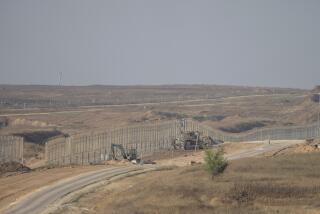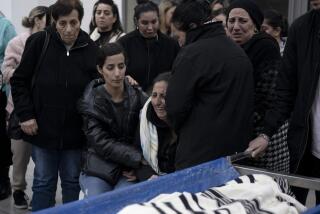West Bank Suicide Bombing Kills 4 Israelis, Officials Say
- Share via
JERUSALEM — A Palestinian suicide bomber blew himself up just outside a Jewish settlement in the northern West Bank on Thursday night, killing four Israelis, authorities said.
Israeli officials said it appeared that the bomber had hitched a ride with the Israelis, perhaps by disguising himself as a religious Jew, and then set off the explosives inside the vehicle as it approached the Kedumim settlement.
“It seems that he hitchhiked. The theory at the moment is that he was dressed up,” said Micky Rosenfeld, an Israeli police spokesman.
An offshoot of the Al Aqsa Martyrs Brigade, which is tied to the Fatah movement led by Palestinian Authority President Mahmoud Abbas, claimed responsibility for the attack, the Associated Press reported.
The attack was the first suicide bombing in the West Bank since Dec. 29, when a bomber detonated his explosives near an Israeli military checkpoint outside the northwestern town of Tulkarm, killing an Israeli soldier and two Palestinians.
“The Palestinian Authority has remained totally apathetic regarding taking any discernible measures to prevent terror against Israelis. We saw the results today in Kedumim,” said David Baker, an Israeli government spokesman.
The attack came two days after Israeli voters gave their biggest support to parties that favor further withdrawals from the West Bank, even if unilateral.
Acting Prime Minister Ehud Olmert, leader of the Kadima movement formed last fall by Prime Minister Ariel Sharon, has called for setting permanent borders within four years by pulling back to the main settlement blocks nearest Israel and forsaking isolated communities.
Olmert, whose party fell short of expectations but still won the most parliamentary seats, is expected to be asked to form the next government. He has said any members of a Kadima-led coalition must back his withdrawal plan, which would require relocating tens of thousands of Jewish settlers from land many of them view as their biblical birthright.
Wrangling over the shape of the new coalition was already underway, with the second-place Labor Party the likeliest to join, along with two or more smaller parties.
Labor, a left-leaning party headed by former union leader Amir Peretz, will demand key ministries, such as finance or defense, as well as reforms to increase the minimum wage and upgrade other benefits for working-class Israelis.
Shas, a religious party favored by many working-class Jews of Middle Eastern and North African origin, is another possible coalition partner and is sure to demand more spending for social welfare.
Updated vote tallies reported late Thursday gave Kadima an additional seat, bringing it to 29 of 120 spots in the parliament, or Knesset. Labor stayed at 20 seats, and the dovish Meretz, another possible coalition member, rose by one to five. Shas fell by one seat in the updated tally to 12.
Despite its weaker-than-expected showing, Kadima appeared able to forge a majority supporting the idea of ceding more land in the West Bank.
Sharon last summer led Israel to abandon all 21 Jewish settlements in the Gaza Strip and four in the northern West Bank. He later bolted from the conservative Likud Party, once a staunch defender of the settlement movement, and formed Kadima to separate himself from those in the party who had vehemently opposed the pullout. Olmert was thrust into power in January when Sharon suffered a stroke and slipped into a coma.
Likud, led by former Prime Minister Benjamin Netanyahu, suffered a devastating defeat in Tuesday’s elections, garnering just 12 seats, according to the revised tally.
Olmert has made clear that he is prepared to give up more territory in the West Bank to set borders by 2010, and said Israel would do so on its own if agreement with the Palestinians was impossible.
It is a moment of heightened uncertainty because the Palestinian government is also in transition, with the radical Islamic group Hamas now in charge. On Thursday, Hamas ministers assumed their posts after ceremonies that were largely orderly.
Hamas won control of the government after soundly defeating Fatah in parliamentary elections in January, but the group is under international pressure to moderate its militant stance toward Israel or risk losing hundreds of millions of dollars in foreign aid to the Palestinians.
More to Read
Sign up for Essential California
The most important California stories and recommendations in your inbox every morning.
You may occasionally receive promotional content from the Los Angeles Times.










